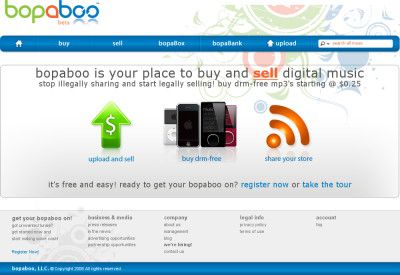From our front-page news:
For as long as music has been sold, so has "used" music. Who hasn't at least once gone into a music store and looked at the hidden gems in their used section? Doesn't have to be music... could be video games, movies, anything. There's a reason flea markets are still so popular. Well, since so many things have gone digital (including all three of those things), the idea of selling them "used" is probably something that not many people have even contemplated.
Until now, maybe. Whether this is a joke or not, it's hard to tell, but online site Bopaboo (currently in a sign-up beta) has that exact idea in mind. Reading their site, you'll see messages like "Bopaboo is your place to buy and sell digital music" and "start legally selling". How exactly you "legally" sell digital music is beyond me, and it seems to be something that's confusing a lot of people. One thing's for sure, if this service ever goes public, the RIAA is sure to be knocking on their door fast.
The problem is twofold. The first problem is honesty. If you sell a track, nothing forces you to delete it from your computer... and this service sure isn't going to have a way to verify that. Such an issue could result in huge piracy. Someone could either sell lots of the same song, or people could share collections and sell that way. This sounds about as shady as AllofMP3, back in the day.
The other problem is of course the music industry. They are going to have something to say about this, regardless of whether or not they can prove it's wrong. It's not illegal to sell a CD you bought at a store, so it's very difficult to prove that digital music is any different. Realistically speaking though, you could easily sell an album and never delete it from your own computer, and that fact is where things will get sticky. This is going to be an interesting to watch. Despite it being an oddball service, I hope it actually does launch, just to see what kind of chaos ensues.

The logic behind it is that it's legal to sell on a CD you've bought - so why can't you do the same with a music file? In case you haven't spotted it yet, the difference is that when you sell a CD, you don't get to keep an identical copy of it for yourself. Which is probably a point that the record labels and their lawyers are making right now.
Source: Metro.co.uk
Until now, maybe. Whether this is a joke or not, it's hard to tell, but online site Bopaboo (currently in a sign-up beta) has that exact idea in mind. Reading their site, you'll see messages like "Bopaboo is your place to buy and sell digital music" and "start legally selling". How exactly you "legally" sell digital music is beyond me, and it seems to be something that's confusing a lot of people. One thing's for sure, if this service ever goes public, the RIAA is sure to be knocking on their door fast.
The problem is twofold. The first problem is honesty. If you sell a track, nothing forces you to delete it from your computer... and this service sure isn't going to have a way to verify that. Such an issue could result in huge piracy. Someone could either sell lots of the same song, or people could share collections and sell that way. This sounds about as shady as AllofMP3, back in the day.
The other problem is of course the music industry. They are going to have something to say about this, regardless of whether or not they can prove it's wrong. It's not illegal to sell a CD you bought at a store, so it's very difficult to prove that digital music is any different. Realistically speaking though, you could easily sell an album and never delete it from your own computer, and that fact is where things will get sticky. This is going to be an interesting to watch. Despite it being an oddball service, I hope it actually does launch, just to see what kind of chaos ensues.

The logic behind it is that it's legal to sell on a CD you've bought - so why can't you do the same with a music file? In case you haven't spotted it yet, the difference is that when you sell a CD, you don't get to keep an identical copy of it for yourself. Which is probably a point that the record labels and their lawyers are making right now.
Source: Metro.co.uk
